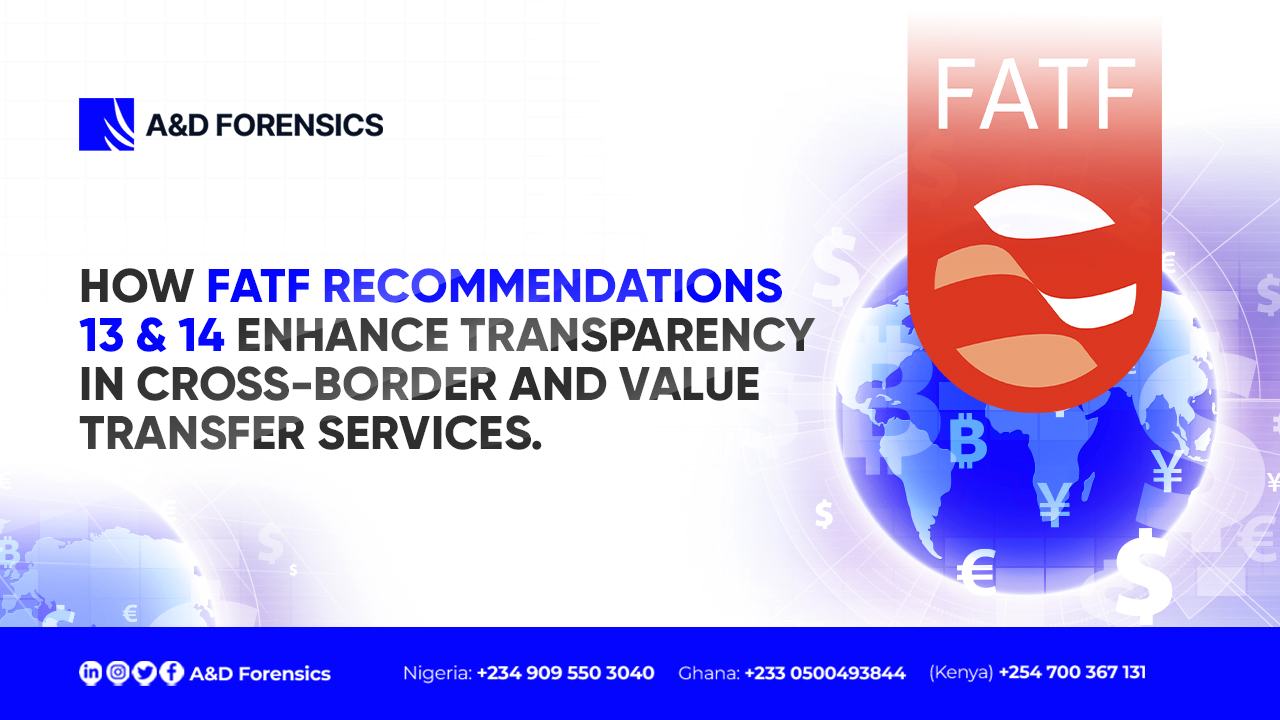FATF Recommendation play a critical role in shaping global responses to financial crime. As the global financial landscape rapidly evolves, with increasing digitization and the growth of cross-border financial transactions, the need for enhanced transparency, robust regulation, and effective risk mitigation has never been more critical.
The Financial Action Task Force (FATF) is an intergovernmental body established to combat money laundering and terrorist financing, provides a framework of recommendations that help countries address emerging financial threats. Among the 40 FATF Recommendations, FATF Recommendation 13 and FATF Recommendation 14 stand out for their role in improving transparency in cross-border correspondent banking and in regulating new payment technologies, including virtual currency and digital financial services.
Understanding FATF Recommendation 13: Correspondent Banking.
FATF Recommendation 13 focuses on the risks associated with correspondent banking relationships, where a bank (the correspondent) provides services on behalf of another bank (the respondent), often across borders. These relationships are essential for facilitating international trade and finance but can also be exploited for illicit purposes due to the complexity and layers of financial intermediaries involved.
How FATF Recommendation 13 Aids Anti-Money Laundering (AML).
FATF Recommendation 13 strengthens AML efforts by setting strict standards for cross-border correspondent banking. It requires:
- Enhanced Due Diligence (EDD): Financial institutions must assess the risk profile of foreign partner banks to prevent illicit access to the global financial system.
- Understanding the Respondent Bank: Banks must gather detailed information about their counterparts, promoting transparency and helping detect hidden risks like shell banks.
- No Dealings with Shell Banks: Institutions are prohibited from engaging with unregulated or non-transparent banks, blocking key channels often exploited for money laundering.
- Ongoing Monitoring: Banks must continuously monitor transactions and relationships to detect suspicious activities early and support effective reporting.
Enhancing Transparency Through FATF Recommendation 13.
- Increased Accountability: By requiring EDD on respondent institutions, Recommendation 13 ensures banks have a clear understanding of their cross-border counterparts.
- Traceability of Transactions: Proper documentation and monitoring of correspondent accounts make it easier to trace the origin and destination of funds.
- Mitigating Layering Risks: Enhanced scrutiny helps detect and disrupt attempts to use multiple intermediaries to conceal illicit financial flows.
Understanding FATF Recommendation 14: Money or Value Transfer Services (MVTS).
Recommendation 14 addresses the regulatory expectations for money or value transfer services (MVTS), including both traditional remittance services and mobile money operators. These services are critical for financial inclusion but also pose high ML/TF risks due to their speed, accessibility, and potential anonymity.
How FATF Recommendation 14 aids Anti-Money Laundering (AML).
FATF Recommendation 14 strengthens AML by regulating Money or Value Transfer Services (MVTS), including remittance services, mobile money platforms, and virtual currency providers. It ensures:
- Mandatory Licensing/Registration: All MVTS providers must be licensed or registered, bringing them under formal regulatory oversight and preventing unmonitored fund transfers.
- AML/CFT Compliance: Providers must follow AML obligations like customer due diligence, record-keeping, and reporting suspicious transactions, which promotes transparency and traceability.
- Sanctions for Unlicensed Operations: Countries must penalize unlicensed MVTS operators, discouraging underground networks and enhancing accountability.
- Coverage of Virtual Currencies Services: virtual currencies and wallet providers are included, reducing anonymity in digital transactions.
Enhancing Transparency Through FATF Recommendation 14.
- Regulatory Visibility: Mandatory registration/licensing creates a formal registry of MVTS providers, ensuring regulators know who is operating in the market.
- Digital Finance Oversight: The recommendation applies to virtual currencies providers, extending AML/CFT expectations to the digital currencies space.
- Reduced Anonymity: Enforced compliance with CDD and transaction monitoring reduces the anonymity that criminals often seek in digital transactions.
Implementation Challenges and Considerations of FATF Recommendation 13 and 14.
While the recommendations offer clear benefits, implementation across jurisdictions comes with challenges:
- Regulatory Arbitrage: Inconsistent adoption across countries can lead bad actors to exploit weaker regulatory regimes.
- Resource Constraints: Developing nations may struggle to enforce these measures due to limited regulatory capacity or technological infrastructure.
- Balancing Inclusion and Regulation: Overregulation can inadvertently exclude unbanked populations who rely on MVTS or digital wallets.
To address these challenges, the FATF continues to issue guidance, conduct peer reviews (mutual evaluations), and support capacity building in lower-income countries.
Impact of FATF Recommendation 13 and 14 on Cross-Border and Virtual Currency Transparency.
When applied in tandem, Recommendation 13 and 14 create a comprehensive barrier to financial opacity, especially in sectors most vulnerable to exploitation:
- Cross-Border Transactions: Enhanced due diligence in correspondent banking ensures all layers of an international transaction chain are known and documented.
- Virtual Currency Ecosystem: Licensing and compliance requirements for VASPs reduce the risks of money laundering via virtual currencies or wallets.
- Financial Integrity: The recommendations strengthen trust in global financial systems by making it more difficult for criminals to hide their activities.
- Improved Collaboration: The framework encourages international cooperation among regulators and financial institutions, streamlining the fight against transnational financial crime.
Conclusion.
FATF Recommendations 13 and 14 are vital pillars for enhancing transparency in today’s fast-moving, digital financial landscape. By strengthening due diligence in correspondent banking (Rec. 13) and enforcing strict oversight of Money or Value Transfer Services including virtual currency providers (Rec. 14) these recommendations significantly curtail opportunities for money laundering and terrorist financing.
Explore FATF Recommendation 1 to 10 in our previous blog:
- FATF Recommendation 1 and 2
- FATF Recommendation 3 and 4
- FATF Recommendation 5 and 6
- FATF Recommendation 7 and 8
- FATF Recommendation 9 and 10
- FAFT Recommendation 11 and 12
Contributor: Ibrahim Anuoluwapo Azeez






